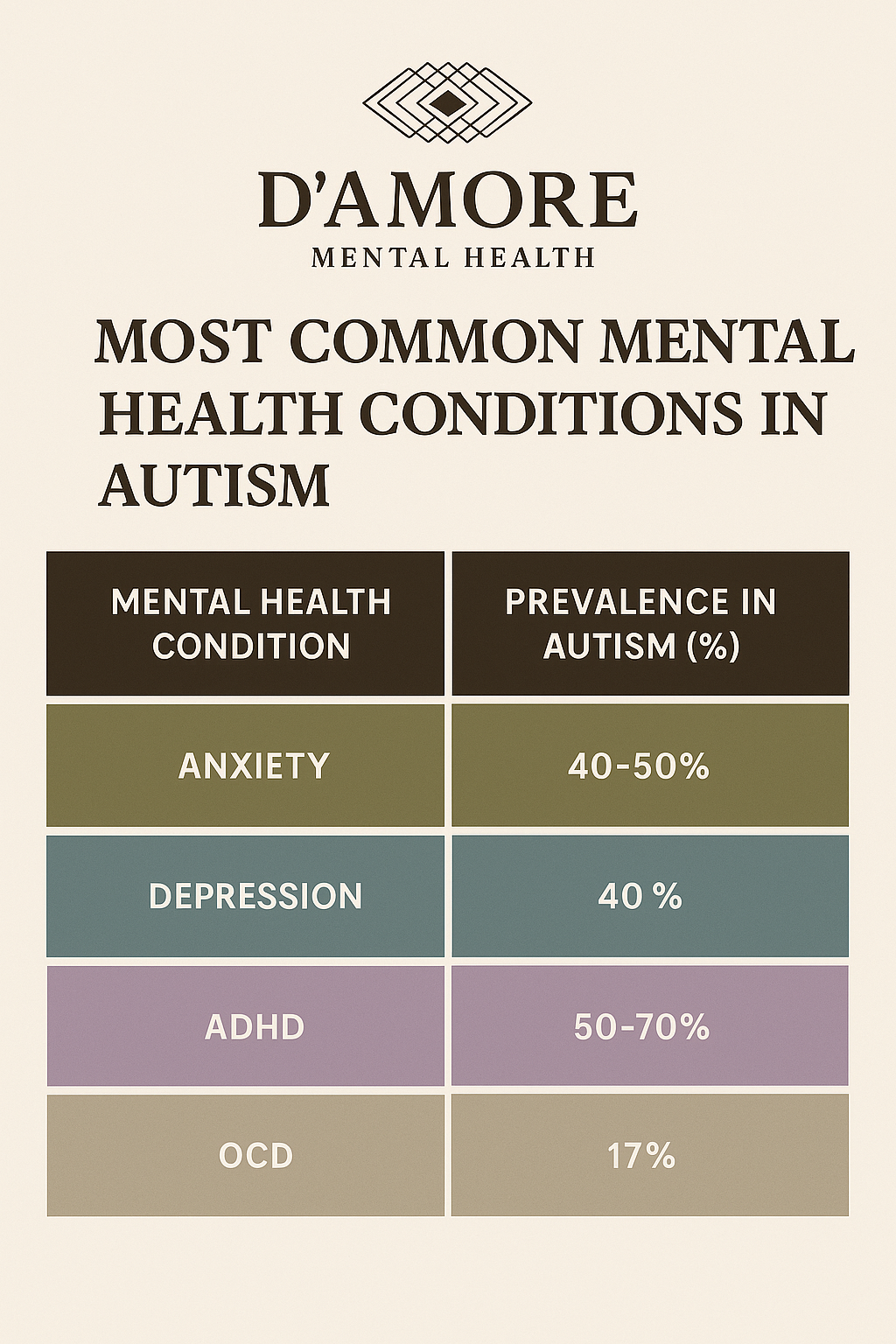Living with autism spectrum disorder (ASD) presents unique challenges in navigating daily life, social interactions, and personal development. What many people don’t realize is that individuals on the autism spectrum are significantly more likely to experience co-occurring mental health conditions than the general population. Understanding these common comorbidities is essential for proper diagnosis, effective treatment, and improved quality of life.
At D’Amore Mental Health, we recognize the importance of addressing the complete mental health picture for individuals with autism spectrum disorder. This comprehensive guide explores the most common mental health disorders that affect people on the autism spectrum, their symptoms, and approaches to treatment.
The Connection Between Autism and Mental Health
Autism spectrum disorder is a neurodevelopmental condition characterized by differences in social communication, sensory processing, and patterns of behavior or interests. While autism itself is not a mental illness, the unique neurological differences and life experiences of autistic individuals can create vulnerability to certain mental health conditions. At D’Amore, we understand these challenges through our autism in adults treatment approach.
Research consistently shows that people on the autism spectrum experience mental health disorders at significantly higher rates than the general population. According to the Centers for Disease Control and Prevention (CDC), co-occurring conditions are common among individuals with autism and require careful consideration in treatment planning. Various factors contribute to this increased vulnerability:
- Neurobiological factors: Shared genetic and neurological pathways may predispose individuals to both autism and certain mental health conditions
- Environmental challenges: Difficulties navigating neurotypical social expectations and environments can create chronic stress
- Communication barriers: Challenges expressing emotions or needs may lead to frustration and psychological distress
- Sensory sensitivities: Ongoing sensory overload or discomfort can contribute to anxiety and mood issues
- Social isolation: Reduced social connection and support networks can impact mental wellbeing
Recognizing these underlying factors helps in developing more effective, autism-informed approaches to mental health treatment.
Anxiety Disorders
Anxiety disorders are among the most prevalent mental health conditions affecting individuals on the autism spectrum, with research suggesting that 40-60% of autistic people will experience clinically significant anxiety during their lifetime. D’Amore offers specialized anxiety treatment that considers these unique needs.
Generalized Anxiety Disorder (GAD)
People with generalized anxiety disorder experience persistent and excessive worry about various aspects of life. For autistic individuals, this anxiety often centers around:
- Unpredictable changes in routine or environment
- Performance in social situations
- Sensory overwhelm in certain environments
- Fear of not meeting expectations
The experience of GAD may present differently in autistic individuals. While traditional symptoms like restlessness, fatigue, and difficulty concentrating apply, anxiety in autism might also manifest as:
- Increased repetitive behaviors or stimming
- Heightened sensory sensitivities
- Irritability or meltdowns
- Withdrawal from activities or environments
Social Anxiety Disorder
Social anxiety disorder involves intense fear of social situations and negative evaluation by others. Given that social communication differences are a core feature of autism, distinguishing between autistic social differences and social anxiety requires careful assessment.
Social anxiety in autistic individuals may focus on:
- Fear of being misunderstood or misinterpreting others
- Anxiety about breaking unwritten social rules
- Worry about sensory overload in social settings
- Concern about being rejected due to autistic behaviors
Specific Phobias
Specific phobias—intense fears of particular objects or situations—occur at higher rates in the autism population. These fears often connect to sensory sensitivities or negative past experiences.
Common specific phobias in autism may include:
- Loud noises (like fire alarms or thunderstorms)
- Certain textures or physical sensations
- Medical procedures or settings
- Particular animals or insects
Obsessive-Compulsive Disorder (OCD)
OCD features unwanted thoughts (obsessions) and repetitive behaviors or mental acts (compulsions) performed to reduce anxiety. Distinguishing between autism-related repetitive behaviors and OCD compulsions requires careful assessment, as they serve different functions. Learn more about our OCD treatment approach.
Key differences include:
- Autism repetitive behaviors: Often provide comfort, regulation, or enjoyment
- OCD compulsions: Performed specifically to reduce anxiety about feared outcomes
OCD in autism often includes:
- Contamination fears and cleaning rituals
- Symmetry obsessions and ordering compulsions
- Checking behaviors to prevent harm
- Need for reassurance about feared outcomes
Depression and Mood Disorders
Mood disorders, particularly depression, affect approximately 20-30% of individuals on the autism spectrum—about three times the rate in the general population.
Major Depressive Disorder
Depression in autism may present with both typical and atypical symptoms. D’Amore offers comprehensive depression treatment tailored to individual needs:
Traditional symptoms include:
- Persistent sadness or low mood
- Loss of interest in previously enjoyed activities
- Changes in sleep, appetite, and energy
- Difficulty concentrating
- Feelings of worthlessness
Autism-specific presentations may include:
- Increased withdrawal from social interaction
- Intensification of repetitive behaviors
- Greater irritability or aggression
- Changes in special interest engagement
- Regression in adaptive skills
Depression in autism often develops in adolescence or early adulthood, particularly as social demands increase and awareness of differences grows. This period represents a critical time for supportive intervention.
Bipolar Disorder
Bipolar disorder involves alternating periods of depression and mania or hypomania. Research suggests that bipolar disorder occurs in 6-8% of autistic individuals, higher than the general population rate of 2-3%. Our bipolar disorder treatment program addresses these complex presentations.
Manic episodes in autistic individuals may present as:
- Intensification of special interests
- Increased agitation and sensory seeking
- Reduced need for sleep without fatigue
- Racing thoughts and pressured speech
- Risky behaviors out of character for the individual
The cyclical nature of bipolar disorder can be particularly disruptive for autistic individuals who often thrive with predictability and routine.
ADHD (Attention-Deficit/Hyperactivity Disorder)
ADHD and autism frequently co-occur, with approximately 30-50% of autistic individuals also meeting criteria for ADHD. This combination presents unique challenges and requires specialized treatment approaches. D’Amore provides effective ADHD treatment that addresses these overlapping conditions.
ADHD features persistent patterns of inattention and/or hyperactivity-impulsivity that interfere with functioning and development. In autism, ADHD symptoms may manifest as:
- Inattention:
- Difficulty sustaining attention except in areas of special interest
- Struggles with transitioning between activities
- Challenges with organization and time management
- Appears not to listen when spoken to directly
- Hyperactivity/Impulsivity:
- Physical restlessness or fidgeting
- Difficulty waiting or taking turns
- Acting without considering consequences
- Interrupting others or talking excessively
The presence of both conditions can complicate diagnosis, as some symptoms overlap. For example, social difficulties could stem from autism, ADHD impulsivity, or both. Comprehensive assessment by clinicians familiar with both conditions is essential.
Trauma-Related Disorders
People on the autism spectrum experience higher rates of bullying, rejection, and adverse life events, contributing to increased vulnerability to trauma-related disorders.
Post-Traumatic Stress Disorder (PTSD)
PTSD develops after exposure to traumatic events and involves intrusive memories, avoidance behaviors, negative mood changes, and heightened reactivity. For autistic individuals, trauma may result from: (Learn more about our PTSD and trauma treatment)
- Bullying and social exclusion
- Restraint or seclusion practices
- Medical procedures
- Sensory overwhelming events
- Chronic misunderstanding and invalidation
PTSD symptoms in autism may present atypically, including:
- Increased repetitive behaviors during stress
- New avoidance of previously tolerated sensory experiences
- Regression in skills or adaptive functioning
- Intensification of special interests as coping mechanisms
- Sleep disruption with or without nightmares
Some researchers have proposed a distinct form of trauma response in autism called Autistic Burnout, characterized by exhaustion, increased autism traits, and reduced functioning following extended periods of stress and masking (hiding autistic traits).
Eating Disorders
Research indicates that individuals on the autism spectrum are at higher risk for developing eating disorders, with some studies suggesting autistic traits are present in 20-30% of people with anorexia nervosa.
Avoidant/Restrictive Food Intake Disorder (ARFID)
ARFID involves limited food intake not motivated by body image concerns but by sensory sensitivities, fear of adverse consequences, or lack of interest in eating. This disorder is particularly common in autism and may involve:
- Extreme food selectivity based on texture, taste, smell, or appearance
- Fear of choking, vomiting, or other negative consequences from eating
- Limited appetite or interest in food
- Nutritional deficiencies or weight loss due to restricted intake
ARFID differs from typical “picky eating” in its significant impact on nutrition, weight, or psychosocial functioning.
Anorexia Nervosa and Bulimia Nervosa
Traditional eating disorders like anorexia and bulimia also occur at higher rates in the autism population. The cognitive rigidity, detail-focus, and rule-following common in autism may contribute to the rigid food rules and behaviors in these disorders.
In autistic individuals, these disorders may feature:
- Rigid rules around food, eating, and exercise
- Focus on numbers and measurements
- Less emphasis on body image and more on control or rules
- Difficulty recognizing internal hunger and fullness cues
Personality Disorders
While personality disorders require careful diagnosis, research suggests that certain personality disorders co-occur with autism at higher rates than in the general population.
Borderline Personality Disorder (BPD)
BPD involves a pervasive pattern of instability in relationships, self-image, and emotions. The emotional dysregulation central to BPD can overlap with emotional challenges in autism, leading to diagnostic complexity. D’Amore offers specialized borderline personality disorder treatment that considers these nuances.
Features that may appear in both conditions include:
- Difficulty managing emotions
- Black-and-white thinking
- Challenges in relationships
- Identity uncertainty
However, the underlying mechanisms differ. In autism, these features stem from neurodevelopmental differences, while in BPD they typically relate to attachment and trauma histories. Some individuals may genuinely have both conditions.
Schizoid Personality Disorder
Schizoid personality disorder involves detachment from social relationships and limited emotional expression. The social withdrawal in this disorder can superficially resemble autism, though the underlying motivations differ.
Careful assessment is needed to distinguish between:
- Autistic social differences based on communication challenges and sensory issues
- Schizoid detachment based on genuine disinterest in social connection
Schizophrenia Spectrum Disorders
Research suggests a complex relationship between autism and schizophrenia spectrum disorders. While once considered entirely separate conditions, newer research indicates some shared genetic risk factors and occasional co-occurrence. Our schizophrenia treatment program addresses these complex presentations.
Schizophrenia involves psychotic symptoms (hallucinations, delusions), disorganized thinking, and negative symptoms (reduced emotional expression, motivation). When co-occurring with autism, diagnosis can be complicated by:
- Communication differences that make describing internal experiences difficult
- Overlap between negative symptoms of schizophrenia and some autism features
- Unusual thought patterns that may be misinterpreted as delusional
Early identification of psychotic symptoms in autistic individuals is crucial for appropriate treatment and support.
Substance Use Disorders
While traditionally thought to occur at lower rates in autism, newer research suggests that substance use disorders may be an underrecognized issue in the autism community, particularly among those without intellectual disability. D’Amore’s dual diagnosis treatment addresses these co-occurring conditions.
Substance use in autism may serve specific functions:
- Self-medication for anxiety or sensory overload
- Facilitation of social interaction
- Management of co-occurring mental health symptoms
- Enhancement of executive function
The rigid thinking patterns in autism may also contribute to difficulty breaking established substance use routines once developed.
Effective Treatment Approaches
Treating mental health conditions in autistic individuals requires specialized approaches that account for neurodevelopmental differences. Effective interventions typically involve:
Autism-Informed Therapy
Traditional therapeutic approaches modified to account for autism-specific needs:
- Cognitive Behavioral Therapy (CBT): Adapted with more concrete language, visual supports, and special interest integration
- Dialectical Behavior Therapy (DBT): Focused on emotional regulation and distress tolerance skills
- Mindfulness-Based Interventions: Modified to accommodate sensory sensitivities and processing differences
Medication Management
Psychopharmacological approaches may include:
- Careful dosing and monitoring for increased sensitivity to side effects
- Treatment of specific target symptoms rather than broad diagnoses
- Consideration of potential interactions with autism-related sensory sensitivities
Sensory Integration and Regulation
Addressing sensory needs is often crucial for mental health management:
- Occupational therapy for sensory processing challenges
- Creation of sensory-friendly environments
- Development of personalized sensory regulation strategies
Social Support and Skills Development
Building social connection while respecting autistic social differences:
- Autism-specific social skills development
- Group therapy and peer support with other autistic individuals
- Education about neurotypical social expectations
The Importance of Integrated Care
At D’Amore Mental Health, we recognize that effective treatment for autistic individuals with co-occurring mental health conditions requires an integrated approach that addresses both neurodevelopmental and psychiatric needs simultaneously.
Our holistic approach includes:
- Comprehensive assessment by clinicians experienced with autism and co-occurring conditions
- Individualized treatment planning that respects autistic identity and needs
- Collaboration between mental health providers, autism specialists, and medical professionals
- Family therapy and support to create understanding environments
Help is Available
The relationship between autism spectrum disorder and mental health is complex and bidirectional. Mental health conditions can significantly impact quality of life for autistic individuals, but with proper understanding, diagnosis, and treatment, positive outcomes are achievable.
By increasing awareness of how mental health conditions may present differently in autism and implementing autism-informed treatment approaches, we can help ensure that autistic individuals receive the support they need to thrive.
If you or a loved one on the autism spectrum is experiencing mental health challenges, D’Amore Mental Health is here to help. Our experienced clinical team understands the unique intersection of autism and mental health and is committed to providing compassionate, effective care tailored to individual needs. Contact our admissions team to learn more about how we can support you on your mental health journey.






































